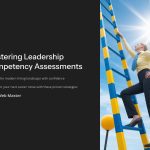 Transitioning to a new role requires more than just an updated resume. Employers are increasingly prioritizing leadership competency assessments to gauge a candidate’s ability to lead, make decisions, and drive results. Whether you’re moving into a managerial position or stepping into a leadership role in a new industry, excelling in these assessments can significantly enhance your chances of landing your desired job. This guide will help you understand leadership competency evaluations, prepare effectively, and showcase your strengths in a compelling way.
Transitioning to a new role requires more than just an updated resume. Employers are increasingly prioritizing leadership competency assessments to gauge a candidate’s ability to lead, make decisions, and drive results. Whether you’re moving into a managerial position or stepping into a leadership role in a new industry, excelling in these assessments can significantly enhance your chances of landing your desired job. This guide will help you understand leadership competency evaluations, prepare effectively, and showcase your strengths in a compelling way.

Understanding Leadership Competency Assessments
Leadership competency assessments evaluate key skills such as strategic thinking, emotional intelligence, decision-making, and team management. These assessments often include scenario-based questions, psychometric tests, and behavioral interviews to assess a candidate’s ability to handle real-world challenges.
Key Areas Assessed:
- Strategic Vision – Ability to plan for the future and align goals with company objectives.
- Decision-Making – Evaluating risks, making informed choices, and taking responsibility.
- Emotional Intelligence – Managing interpersonal relationships effectively.
- Communication Skills – Conveying ideas clearly and persuasively.
- Team Leadership – Motivating and guiding teams toward success.
Understanding what these assessments measure allows you to tailor your preparation to meet employer expectations.

Effective Strategies for Excelling in Leadership Assessments
Performing well in leadership assessments requires a strategic approach. Here are some effective preparation strategies:
- Self-Assessment: Evaluate your strengths and weaknesses using online leadership assessment tools.
- Practice Scenario-Based Questions: Many assessments include hypothetical situations requiring thoughtful responses.
- Develop Emotional Intelligence: Work on self-awareness, empathy, and conflict resolution.
- Strengthen Decision-Making Skills: Analyze case studies and practice making quick, informed choices.
- Seek Feedback: Ask mentors or colleagues for constructive criticism on your leadership approach.
Regularly practicing these strategies ensures that you are well-prepared to demonstrate leadership competencies effectively.

Common Leadership Assessment Questions and How to Answer Them
Understanding the types of questions asked in leadership competency assessments can significantly boost your confidence.
Example Questions:
- Describe a time when you had to resolve a conflict within your team. How did you handle it?
- Tip: Use the STAR method (Situation, Task, Action, Result) to structure your response.
- How do you handle decision-making under pressure?
- Tip: Highlight a real-world example showcasing logical reasoning and adaptability.
- What strategies do you use to motivate your team?
- Tip: Discuss leadership styles, team engagement techniques, and past successes.
Practicing responses to these questions helps in presenting structured, confident answers during evaluations.

Showcasing Leadership Skills on Your Resume and LinkedIn
Your resume and LinkedIn profile should reflect your leadership competencies clearly.
- Use Quantifiable Achievements: Instead of generic statements, provide measurable outcomes (e.g., “Led a team of 20 and increased productivity by 30%”).
- Highlight Key Competencies: Mention leadership training, strategic projects, and mentorship roles.
- Incorporate Strong Action Verbs: Words like “orchestrated,” “championed,” and “streamlined” emphasize leadership impact.
Aligning your personal brand with leadership qualities increases your visibility to recruiters and hiring managers.

Utilizing Mock Assessments and Professional Coaching
Practicing with mock assessments and seeking professional coaching can greatly enhance your performance.
- Enroll in Leadership Development Programs: Many organizations offer specialized training.
- Take Online Leadership Tests: Platforms like SHL, Korn Ferry, and Hogan provide sample tests.
- Work with a Mentor or Coach: Personalized feedback can refine your leadership approach.
By incorporating professional guidance, you improve your readiness for leadership evaluations.

Final Tips for Success in Leadership Competency Evaluations
To maximize success in leadership competency assessments, keep the following tips in mind:
- Stay Confident: Believe in your abilities and maintain a positive mindset.
- Communicate Clearly: Ensure responses are structured and articulate.
- Stay Authentic: Authenticity in responses showcases genuine leadership qualities.
- Time Management: Allocate time wisely during timed assessments.
By following these best practices, you position yourself as a strong candidate for leadership roles.
*Capturing unauthorized images is prohibited*



